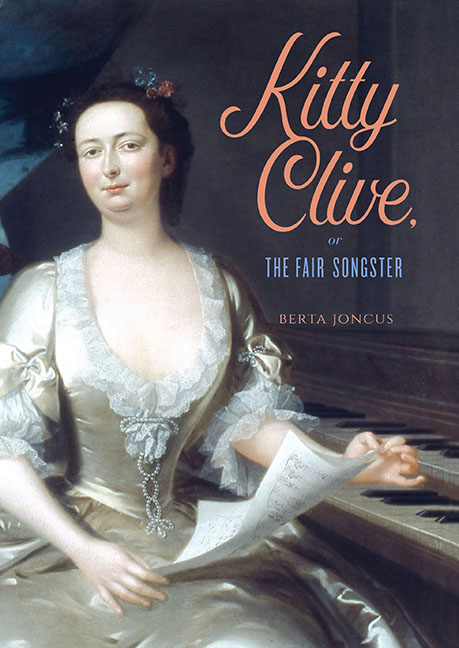Book contents
- Frontmatter
- Dedication
- Contents
- Illustrations
- Preface
- Conventions of Transcription
- 1 The Siren Song: Kitty Clive in the Playhouse
- 2 ‘The Lovely Virgin tun'd her Voice’: Henry Carey and the Production of a Native Songster
- 3 ‘Charm'd with the sprightly Innocence of Nell’: The Metamorphosis of Miss Raftor
- 4 ‘HINT writes, and RAFTOR acts in Drury-lane’: Clive, Fielding, and Theophilus Cibber
- 5 ‘The pious Daughter, and the faithful Wife’: Fielding, Miller, and Clive, 1733–35
- 6 ‘A Likeness where none was to be found’: Contested Images of Clive, 1734–37
- 7 The Patriot Soprano: British Worthies at Drury Lane
- 8 Handel and the Sweet Bird of Drury Lane, 1740–43
- 9 The Case of Mrs. Clive
- 10 Of Scuffles and Rivalries: The Demise of ‘Kitty Cuckoe’
- 11 From Miss Lucy to Mrs. Riot: Voice and Caricature
- 12 Clive on Clive: The Rehearsal: Or, Bays in Petticoats
- 13 Conclusion: The Fair Songster
- Appendix 1 Catherine Clive's Roles 1728–69
- Appendix 2 Lines in Catherine Clive's Repertory 1728–69
- Appendix 3 The Case of Mrs. CLIVE (1744)
- Select Bibliography
- Index
4 - ‘HINT writes, and RAFTOR acts in Drury-lane’: Clive, Fielding, and Theophilus Cibber
Published online by Cambridge University Press: 20 September 2019
- Frontmatter
- Dedication
- Contents
- Illustrations
- Preface
- Conventions of Transcription
- 1 The Siren Song: Kitty Clive in the Playhouse
- 2 ‘The Lovely Virgin tun'd her Voice’: Henry Carey and the Production of a Native Songster
- 3 ‘Charm'd with the sprightly Innocence of Nell’: The Metamorphosis of Miss Raftor
- 4 ‘HINT writes, and RAFTOR acts in Drury-lane’: Clive, Fielding, and Theophilus Cibber
- 5 ‘The pious Daughter, and the faithful Wife’: Fielding, Miller, and Clive, 1733–35
- 6 ‘A Likeness where none was to be found’: Contested Images of Clive, 1734–37
- 7 The Patriot Soprano: British Worthies at Drury Lane
- 8 Handel and the Sweet Bird of Drury Lane, 1740–43
- 9 The Case of Mrs. Clive
- 10 Of Scuffles and Rivalries: The Demise of ‘Kitty Cuckoe’
- 11 From Miss Lucy to Mrs. Riot: Voice and Caricature
- 12 Clive on Clive: The Rehearsal: Or, Bays in Petticoats
- 13 Conclusion: The Fair Songster
- Appendix 1 Catherine Clive's Roles 1728–69
- Appendix 2 Lines in Catherine Clive's Repertory 1728–69
- Appendix 3 The Case of Mrs. CLIVE (1744)
- Select Bibliography
- Index
Summary
The joint interests of Theophilus Cibber and Henry Fielding – winning The Lottery – Fielding's representation of players – a trip to the bordello – reversion to Clive's line – The Devil to Pay dressed as Molière – the spectre of Fenton – Clive gets the last word
Following her spectacular success in The Devil to Pay, Clive began the 1731–32 season as uncontested mistress of Drury Lane's vocal stage works, serious and comic. But she had yet to shine in straight comedy, and other actresses were inheriting Anne Oldfield's celebrated roles. To advance, Clive had to eclipse her rivals in non-musical stage works. Theophilus Cibber once more intervened in her career as summer manager, bringing out Clive's first vehicles without song. These were by Henry Fielding, London's favourite new playwright. Fielding supplied Cibber with a double bill: the mainpiece The Old Debauchees and the afterpiece The Covent Garden Tragedy. They were hardly the career-boosters for which Clive might have hoped. Instead, they traded on Clive's popularity to showcase the younger Cibber, and they represented a miscalculation on Fielding's part that audiences were as interested in sex as he was.1 In The Old Debauchees, Clive represented a girl nearly despoiled; in The Covent Garden Tragedy she played a prostitute. In all four of his Clive vehicles for the 1731–32 season (The Lottery, The Old Debauchees, The Covent Garden Tragedy, and The Mock Doctor), Fielding saw to it that if Clive had a farcical scene, it was opposite Cibber, with the jokes being at Clive's expense. In this way Fielding extended Cibber's established line even as he veered wildly away from Clive's.
Both The Old Debauchees and The Covent Garden Tragedy flopped, and the licentiousness of The Covent Garden Tragedy sparked outrage among critics. Damage control took the form of the hastily written The Mock Doctor, which Fielding adapted from Molière with additions redolent of The Devil to Pay. Rather than a cobbler, it was now Theophilus Cibber who got to abuse Clive on stage. Cibber then had Clive debut as Polly in The Beggar's Opera; puffs hailed her as the new Fenton, and falsely asserted that audiences loved Clive's Polly.
- Type
- Chapter
- Information
- Kitty Clive, or the Fair Songster , pp. 105 - 137Publisher: Boydell & BrewerPrint publication year: 2019



